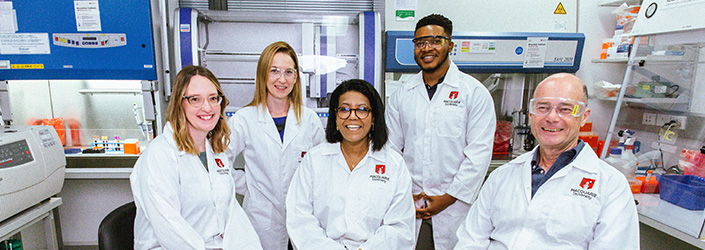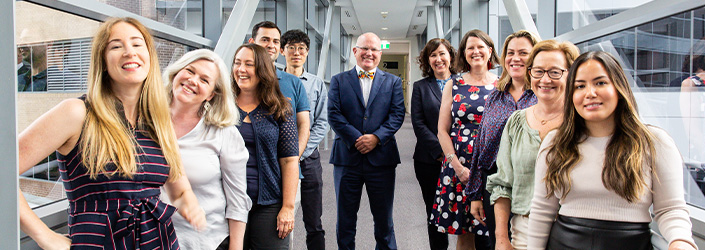Level 1, 75 Talavera Road
Macquarie University
World-leading clinical and research resources
The Neurodegenerative Disease Biobank and our multidisciplinary MND service and clinic are critical for our research into this awful disease.

Neurogenerative Disease Biobank
The MND Research Centre’s Neurodegenerative Disease Biobank, established in 2013, is a cornerstone of our research program.
All patients of the MND service and clinic, and their families, are invited to contribute to the Neurodegenerative Disease Biobank.
The facility collects nine different sample types:
- cerebrospinal fluid
- deoxyribonucleic acid (DNA)
- fibroblasts
- hair
- peripheral blood mononuclear cells (PBMCs)
- plasma
- ribonucleic acid (RNA)
- serum
- urine.
Through a bespoke sample tracking system within the biobank database, it’s possible to keep an inventory of the 60,000 samples throughout their lifecycle: from collection to processing to storage and ultimately use in research.
A number of measures are in place to ensure that the samples are safe and the privacy of the participants is protected at all times.
We have used 4500 biobank samples in more than 30 research projects, across the fields of:
- genetics
- proteomics
- cellular stress
- biomarkers
- environmental studies.
In addition to samples, the biobank collects extensive demographic, lifestyle and clinical data. These samples and data are an invaluable resource for researchers to increase our understanding of MND, and identify treatments and preventative measures.
We collaborate with researchers across Macquarie University, and those at other institutions nationally and overseas.
- Judith Heads – Manager
- David Poynter – Systems Developer
- Susan D’Silva – Biobank Coordinator
- Corinne Phillips

Multidisciplinary MND service and clinic
Established in 2010, our MND service and clinic is the largest in Australia, and it is doubling patients’ survival rates.
We assist patients from early diagnosis through therapeutic trials, multidisciplinary care and end-of-life care.
The majority of our patients have sporadic MND, however the clinic currently also cares for 80 families that have a faulty gene that causes MND.
There are now more than 40 genes reported to cause inherited MND, and families have access to in-house genetic counselling at no cost. These families can also access IVF to prevent MND in the next generation.
Through donations, we were recently able to buy a new Quanterix Simoa, a special machine that enables clinicians to measure markers related to nerve damage. Previously, we had to send MND patient blood samples to Sweden to have them tested.
The clinic also uses its charitable fund to pay for patients without private health insurance to be admitted to the MUH when appropriate so that they can have continuity of care.
Our patients visit every three months for consultations with any of the following, as necessary:
- a clinical nurse consultant
- a dietitian
- a genetic counsellor
- an occupational therapist
- a physiotherapist
- a respiratory physician
- a social worker
- a speech pathologist
- Professor Dominic Rowe, the neurologist who runs the clinic.
Learn more about our:
- Professor Dominic Rowe – Clinical Neurologist and researcher
- Kristina Barnes – Clinical Nurse Consultant
- Richard Gan – Clinical Trials Coordinator
- Paula Ordonez Artunduaga – Clinical Trials Coordinator
- Sally Pittendrigh – Speech pathologist
- Meaghan Joyce – Dietician
- Kylie Christel – Occupational Therapist
- Kate Bradbury – Physiotherapist
- Elizabeth Hannan – Social Worker
- Christie Charlin – Social Worker
- Rosie Fell – Genetic Counsellor
- Ashley Crook – Genetic Counsellor
- Alex Dollman – Respiratory and Sleep Physician
- Kristie Stamford – MND advisor from MND NSW
- Umut Rende – Research Assistant
- Jing Li
- Katrina Turnball
- Sinduja Subramanian